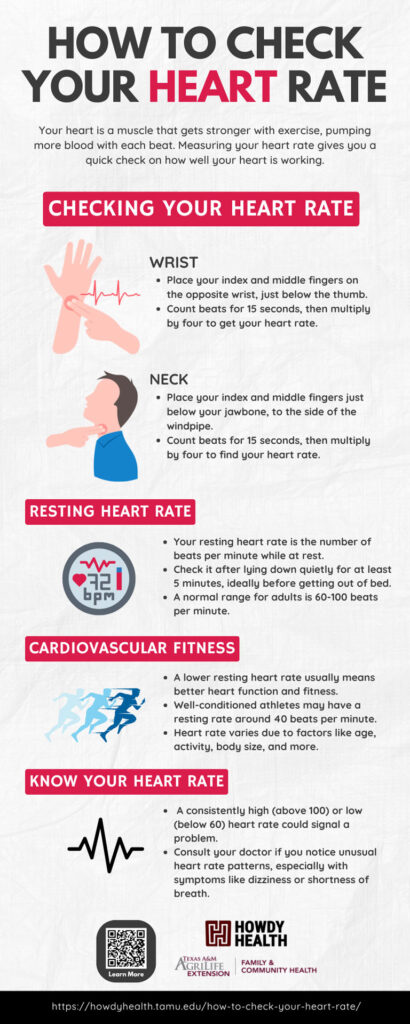Your heart is a muscle, and like other muscles, the more you work your heart the stronger it becomes. With exercise, over time, your heart can work more efficiently and pump out a greater volume of blood with every beat,1 which helps oxygen and nutrients to be more efficiently delivered to your body. Measuring your heart rate is one easy way to gauge your health, since it gives you a quick, real-time indicator of your heart muscle function.2
Checking your heart rate
You can measure your heart rate by simply checking your pulse,3 either at the wrist or side of the neck.3,4
- At the wrist, lightly press the index and middle finger of one hand on the opposite wrist, just below the base of the thumb.4
- At the side of the neck, lightly press your index and middle finger just below the jawbone to the side of the windpipe.3,4
Once you feel your pulse, count the number of beats in 15 seconds; then multiply this number by four (to calculate your beats per minute). That’s your heart rate.
Resting heart rate
Your resting heart rate can tell you some things about your health. Your resting heart rate is the number of times your heart beats in one minute while at rest.5 You should be lying down in a quiet area for at least five minutes6 to assess your resting heart rate. A good time to check your resting heart rate is just before you get out of bed in the morning. A normal resting heart rate for an adult is usually between 60-100 beats per minute.3
Cardiovascular fitness
Typically, a lower resting heart rate is an indicator of more efficient heart function and better cardiovascular fitness.3 For example, a well-conditioned athlete may have a resting heart rate closer to 40 beats per minute.3,4 Heart rate, however, varies from person to person.7 and can be affected by age, activity, body position, body size, emotions, air temperature, caffeine, smoking, and certain medications.2,3
Know your heart rate
An unusually high or low heart rate may indicate an underlying problem. Consult your doctor if your resting heart rate is consistently above 100 beats per minute, or if you’re not an active individual and your resting heart rate is consistently below 60 beats per minute, especially if you have other symptoms, such as dizziness, fainting, or shortness of breath.3 Knowing your heart rate can be a valuable tool in assessing your health and fitness.
Infographic
Download the PDF or share the image below to help others learn more about how to check their heart rate.
- Cleveland Clinic (2017, February 9). How making your heart work harder makes it stronger. Retrieved from https://health.clevelandclinic.org/why-making-your-heart-work-harder-lowers-your-blood-pressure/.
- Corliss, J. (2019, February 6). Want to check your heart rate? Here’s how. Retrieved from https://www.health.harvard.edu/heart-health/want-to-check-your-heart-rate-heres-how.
- Laskowski, ER. What’s a normal resting heart rate. August 29, 2018. https://www.mayoclinic.org/healthy-lifestyle/fitness/expert-answers/heart-rate/faq-20057979.
- American Heart Association (2015, January 4). Know your target heart rates for exercise, losing weight and health. Retrieved from https://www.heart.org/en/healthy-living/fitness/fitness-basics/target-heart-rates.
- National Cancer Institute (n.d.). NCI dictionary of cancer terms: Heart rate. Retrieved from https://www.cancer.gov/publications/dictionaries/cancer-terms/def/heart-rate.
- University of California, Davis (n.d.). Heart rate. Retrieved from https://health.ucdavis.edu/sportsmedicine/resources/heart_rate_description.html.
- Cleveland Clinic (2018, November 18). Pulse and heart rate. Retrieved from https://my.clevelandclinic.org/health/diagnostics/17402-pulse–heart-rate.





